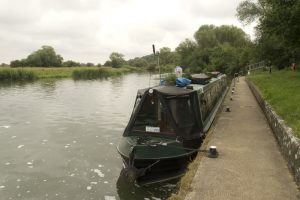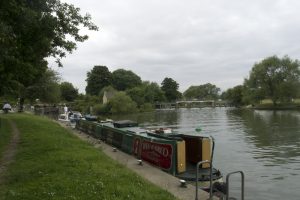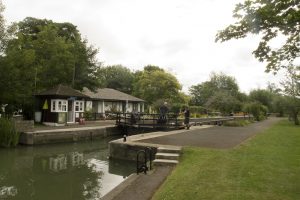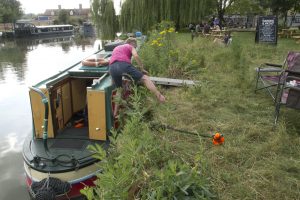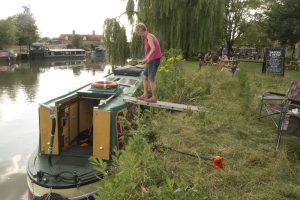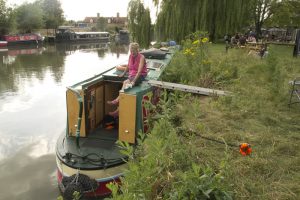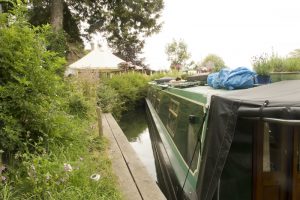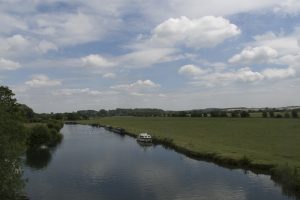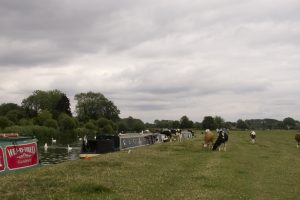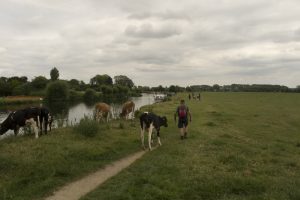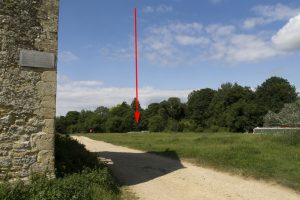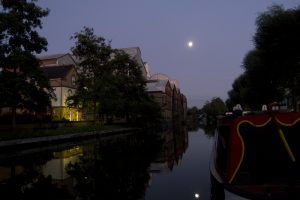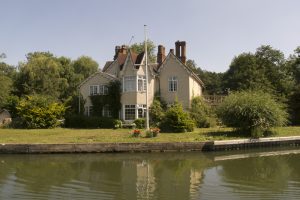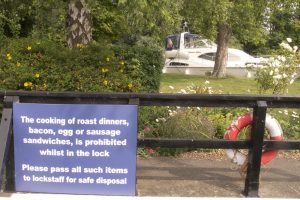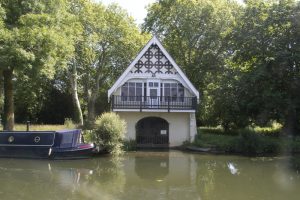I know WRT already wrote about some of our adventures, but there was more.
After a day off, moored just after at Kidlington Green Lock (well, day off for some…
WRT did half a shift, helping me with the laundry, and I did a whole shift doing the laundry and making bread), we do the last part of the Oxford Canal till Duke’s Cut.
Two rather heavy locks, and a liftbridge that actually is down, and has to be opened.
After Duke’s Cut, a very small canal, full of things that float, we’re on the Thames.
For the second time, but we decided: going out of Isis Lock, turn around and go into Isis Lock again doesn’t count.
So, on the Thames. The Upper Thames, or the Rural Thames.
Wide to start off; I feel like being on a bicycle on the motorway. Although, closer to the end of the navigable part it sometimes gets very narrow.
The first night we spend at Eynsham Lock.
Yes, I said Eynsham. I’m on a morris trip again. We’ll pass Eynsham, Bampton, Stanton Harcourt, and Abingdon later, all morris traditions I have danced at one point in my life.
I can but think: “One day I will pass these villages on my own boat? Never!”
All locks on this part of the Thames are hand operated, usually by a lock keeper/keepster. Unless they are on lunch break or have a day off. Then it’s self service.Which is quite easy, the locks are well maintained.
Once in the lock you only want to look at the grounds around the actual lock. Although even lock keepers make comments about my herb garden, you should see what they do around the lock. Just an abundance of flowers, colours, smells.
Our second mooring is at Newbridge. Nice mooring, good pub, but a bit difficult to get off the boat (sorry for the un-elegant person on the picture).
And getting back on is not much easier.
Followed by a jump onto the engine covers (Part 3).
Compared to the above, our third mooring place is a lot easier. Radcot Bridge. Again at a pub.
A lot of moorings at rivers are for yoghurt pots (the cruisers). Mostly we don’t fit at designated moorings, we are way too long. Which is the case in Radcot. But we manage. The bow is just alongside the landing, the stern is somewhere in the shrubs.
Friend Ian mentioned nice rural moorings, when he was on this part of the Thames.
Our mooring in Lechlade (the end of the navigable part) probably can be classed as such.
I class it as rural, mostly because of all the wild animals around here.
About 10,000 swans, all showing you their bare arses (excuse my language). And 5,000 geese. And 1,000 swallows. But at least they all are not dangerous.
The sixty cows are! They eat everything: grass, ropes, fenders, pin markers, seats. Even boats are not safe.
Just imagine, they actually manage to get our middle line off the roof and start nibbling on it! And they attack innocent people, coming back from shopping.
After all this we are on our way back. Back to Oxford, back to the canals and basically back home (we think…).
This time Radcot provides us with a flight show of a Galaxy and later a Hercules. We think it’s one Galaxy and, after six o’clock, two Hercules planes that fly rounds above out heads. There are not that many Galaxy planes in the UK for it to be different planes taking off.
They even fly at night, but it will not bother me.
Next day it’s me on the tiller, doing all the sharp S-bends, going downstream, in the gusty wind. I don’t want to go much faster than tick-over, I don’t want to come around a bend and run into another boat.
So in bends I use the current to move the stern, and then, with a bit of extra revs, turn the bow into the new direction.
Works fine, until… in one bend the stern moves, but just where the bow is, is a gap in the trees. I already mentioned the gusty wind. Well, even maximum revs can’t fight against that wind, so the bow also turns sideways.
So the whole of WRT is going sideways. That would not be a problem, if there was not, just in that bend, an old willow tree. With one bare branch just pointing at the river. At approximate roof height.
And, immediately after that bare branch, a complete, living willow tree, which must be the densest on the Thames.
So the bare branch first scrapes the boat, then lifts off the solar panel (on the far side) and then we get into willow leaves (and branches) and can only duck beneath the roof.
Shit happens.
My arm is scratched, but I’ll survive. The solar panel is hanging in the water, but it is put back on the roof and still works fine. There is another scratch in the paint.
And I know for sure: there was nothing I could have done to prevent it. Yes, hugging around the inside of the bend, but that’s what one doesn’t do on a river…
The next day we stop at the ruin of Godstow Abby. Well, Lawrance is going to try to moor up.
We’re going downstream, and in theory we need to turn around, face upstream in order to be able to moor up. So far the current isn’t very strong, and once one of us is off the boat, WRT is easily kept in place. Up till now we’ve never turned around.
But for some reason Lawrance now decides to turn around to moor up.
Not getting close enough to the bank for me to jump off, and not being fast enough, WRT decides: I’ll do the rest of the turn as well…
Luckily the guy of a nearby boat, hearing the expletives coming from one of the crew members, helps us out.
We’ve one more day on our license. Which means we have go back on the Canal, and find two days to moor, to enable me to visit the museums again.
But Lawrance thinks he remembers somebody saying that all the moorings on the Oxford Canal in Oxford are 24 hours now.
So we do the most sensible thing: we get another seven days license.
We moor up at the former Osney Power Station and do our weekly shopping.
Then I spend two days visiting museums (Ashmolean, History of Science and Pitt Rivers. Plus the Botanic Garden (which is a waste of time and money)).
Lawrance… hovers the boat and replaces the feet of the solar panel that went off.
With still a couple of days on our license we decide to go south to Abingdon Lock.
Another stretch of the river Thames, very nice.
Now we have electric locks, that usually have lock keepers, but today they are all on a course.
So I have to operate them myself:
Open Sluices – Open Gates – Close Gates – Close Sluices – walk to other side of lock – Open Sluices – Open Gates – Close Gates – Close Sluices.
Simpel…!
While Lawrance has tea and cakes I visit the excellent Abingdon Museum, and we have a drink in the Nag’s Head.
Then it’s back to Oxford.
Another two nights at Osney Power Station enables us to do some more shopping and make bread.
Then, on the only day since leaving Warwick that we have rain (we’ll get soaked), we move back on the Oxford Canal, via Isis Lock.
We top up with water at Wolvercote Services, and, fourteen days after we left, we’re back at Kindlington.

